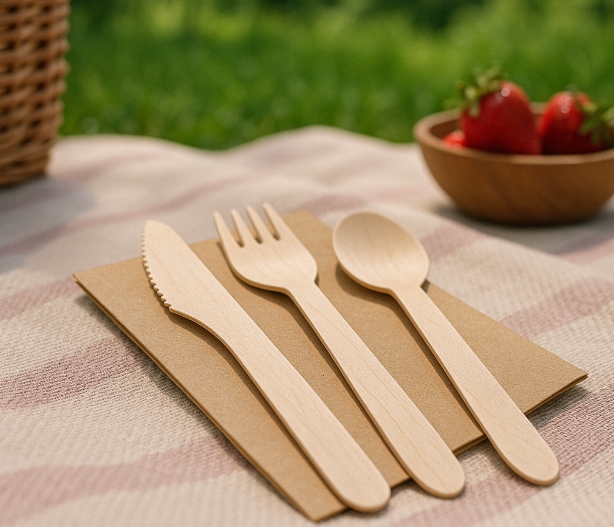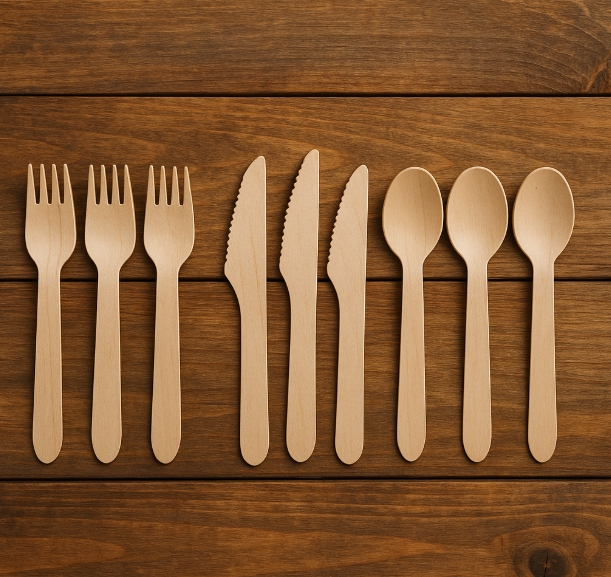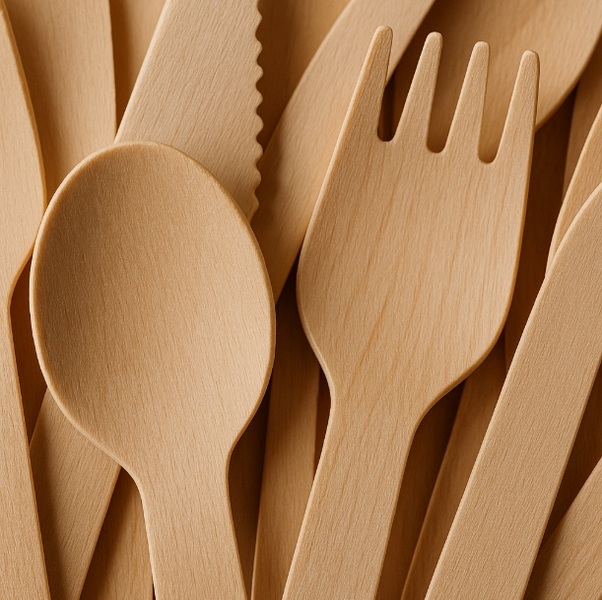
Content Menu
● Understanding Durability in Disposable Wood Cutlery Sets
● Types of Wood Used in Disposable Cutlery Sets
>> Birch Wood
>> Oak Wood
>> Bamboo
● Key Features of the Most Durable Disposable Wood Cutlery Sets
● Comparing Leading Disposable Wood Cutlery Sets
>> Silhouette Birch Wood Eco Friendly Disposable Wooden Cutlery Set
>> SUROQUE Compostable Wooden Cutlery Set
>> Bosnal Wooden Disposable Cutlery Set
>> WoodAbles
>> EcoQuality Disposable Wooden Cutlery Set
● Why Durability Matters in Disposable Wood Cutlery Sets
>> User Experience
>> Safety
>> Environmental Impact
>> Versatility
● How to Test the Durability of a Disposable Wood Cutlery Set
● Environmental Benefits of Durable Disposable Wood Cutlery Sets
● Proper Storage and Use for Maximum Durability
● When to Choose Disposable Wood Cutlery Over Other Materials
● The Manufacturing Process and Its Impact on Durability
● The Evolution of Disposable Wood Cutlery Sets
● Life Cycle Analysis: Wood vs. Other Disposable Materials
● Conclusion
● FAQ: Disposable Wood Cutlery Sets
>> 1. Can disposable wood cutlery sets be reused?
>> 2. Are all disposable wood cutlery sets compostable?
>> 3. What foods can disposable wood cutlery handle?
>> 4. How should disposable wood cutlery be stored for maximum durability?
>> 5. Are disposable wood cutlery sets safe for children?
Disposable wood cutlery sets have become a popular and eco-friendly alternative to plastic utensils, especially for people who care about sustainability and the environment. As more consumers, event planners, and businesses shift toward greener solutions, the question of durability becomes crucial. Which disposable wood cutlery set is most durable? This comprehensive guide will help you understand what makes a disposable wood cutlery set strong, reliable, and suitable for various occasions. We'll explore the types of wood, manufacturing processes, key features, environmental benefits, and how to choose the best set for your needs.

Understanding Durability in Disposable Wood Cutlery Sets
Durability in disposable wood cutlery sets means the utensils can withstand normal eating pressures without breaking, splintering, or losing their shape. A truly durable set will not only survive a meal but also provide a pleasant dining experience. Several factors influence the durability of a disposable wood cutlery set:
- Wood Type: Hardwoods like birch and oak are preferred for their strength and resistance to splintering.
- Manufacturing Quality: Smooth finishes, uniform carving, and proper drying processes ensure safety and longevity.
- Thickness and Design: Thicker utensils with ergonomic shapes are less likely to bend or snap.
- Heat and Moisture Resistance: Quality sets should handle hot soups or cold desserts without warping or softening.
Types of Wood Used in Disposable Cutlery Sets
Birch Wood
Birch wood is one of the most common materials for disposable wood cutlery sets. It's strong, lightweight, and features a smooth texture that resists splintering. Birch is also a renewable resource, making it an environmentally responsible choice.
Oak Wood
Oak is a hardwood known for its toughness and durability. Disposable wood cutlery sets made from oak are less likely to break under pressure, making them ideal for heavy-duty use.
Bamboo
Though technically a grass, bamboo is often used for disposable cutlery. Bamboo utensils are flexible, lightweight, and fast-growing, making them highly sustainable. However, they may not be as rigid as hardwood options.
Key Features of the Most Durable Disposable Wood Cutlery Sets
When searching for the most durable disposable wood cutlery set, look for these essential features:
- Splinter-Free Finish: Ensures a safe and comfortable eating experience.
- Uniform Carving: Prevents weak spots that could break under stress.
- Chemical-Free Production: No coatings, dyes, or glues, making them safe for food and composting.
- Heat Tolerance: Can withstand hot foods without warping or softening.
- Strength Under Pressure: Able to cut through meats and dense foods without snapping or bending.
Comparing Leading Disposable Wood Cutlery Sets
Let's examine some of the most reputable disposable wood cutlery sets available, focusing on their durability and overall performance.
Silhouette Birch Wood Eco Friendly Disposable Wooden Cutlery Set
- Made from 100% natural birch wood.
- Heat tolerant and does not bend or buckle with normal use.
- Compostable and biodegradable.
- Smooth, splinter-free finish.
SUROQUE Compostable Wooden Cutlery Set
- Includes utensils made from birch and bamboo.
- Sturdy construction with minimal splintering.
- Handles large events and heavy foods well.
- Knives and forks are strong enough for meats and salads.
Bosnal Wooden Disposable Cutlery Set
- Sourced from sustainable birch wood.
- Splinter-free, thick, and soak-proof.
- Knives cut through meat; forks and spoons maintain integrity.
- Compostable and eco-friendly.
WoodAbles
- Crafted from hardwood for extra strength.
- Forks, knives, and spoons are all splinter-free.
- Designed for one-time use but with exceptional durability.
- Compostable and safe for the environment.
EcoQuality Disposable Wooden Cutlery Set
- Made from birch wood, free of chemicals and dyes.
- Smooth, sturdy, and suitable for various occasions.
- Compostable and environmentally responsible.

Why Durability Matters in Disposable Wood Cutlery Sets
User Experience
Durable utensils prevent breakage during meals, ensuring guests can enjoy their food without frustration or inconvenience.
Safety
Splinter-free and well-crafted cutlery reduces the risk of injury, especially for children and the elderly.
Environmental Impact
Sturdy sets are less likely to be wasted mid-meal, reducing overall consumption and supporting sustainability efforts.
Versatility
Durable sets can handle a wider range of foods, from salads to steaks, making them suitable for any event or meal.
How to Test the Durability of a Disposable Wood Cutlery Set
- Bend Test: Gently bend the fork or knife; a quality set will resist snapping.
- Cutting Test: Use the knife on a piece of cooked meat or dense vegetable.
- Soak Test: Leave the utensils in hot soup or cold dessert for several minutes; they should not warp or soften excessively.
- Splinter Test: Run your fingers along the edges to check for roughness or splinters.
Environmental Benefits of Durable Disposable Wood Cutlery Sets
- Biodegradability: Most sets decompose within months in compost, unlike plastic that lingers for centuries.
- Sustainable Sourcing: Many brands use wood from responsibly managed forests and plant more trees than they harvest.
- Chemical-Free: No toxins or dyes leach into food or the environment, ensuring safety and sustainability.
Proper Storage and Use for Maximum Durability
- Store in a cool, dry place to prevent moisture absorption.
- Keep sealed until use to avoid contamination and warping.
- Avoid prolonged soaking in liquids to maintain structural integrity.
When to Choose Disposable Wood Cutlery Over Other Materials
- Events and Gatherings: Perfect for picnics, parties, weddings, and catering where convenience and sustainability are priorities.
- Outdoor Activities: Lightweight and safe for camping, barbecues, and festivals.
- Takeout and Delivery: Increasingly favored by restaurants for eco-friendly packaging and single-use convenience.
The Manufacturing Process and Its Impact on Durability
The way disposable wood cutlery sets are made directly affects their strength and reliability. High-quality sets undergo several steps:
1. Wood Selection: Only mature, healthy trees are chosen for their density and grain.
2. Drying: Proper drying prevents warping and cracking.
3. Cutting and Shaping: Precision tools ensure uniform thickness and shape.
4. Sanding and Polishing: Multiple rounds of sanding remove rough edges and splinters.
5. Quality Control: Each piece is inspected for flaws, ensuring only the best pieces make it into the final set.
Sets that skip or rush these steps may be more prone to breaking, splintering, or warping.
The Evolution of Disposable Wood Cutlery Sets
Disposable wood cutlery has evolved significantly from early, rough-hewn utensils to today's smooth, ergonomic, and stylish designs. Modern sets are not only functional but also aesthetically pleasing, often featuring elegant shapes and natural wood grain patterns. This evolution reflects both technological advances and a growing demand for sustainable, high-quality products.
Life Cycle Analysis: Wood vs. Other Disposable Materials
When comparing disposable wood cutlery sets to plastic or bioplastic alternatives, wood stands out for its minimal environmental impact. From sourcing to disposal, wood cutlery:
- Requires less energy to produce than plastic.
- Is compostable and biodegradable, returning nutrients to the soil.
- Avoids the release of microplastics into the environment.
- Supports sustainable forestry and responsible land management.
Conclusion
The most durable disposable wood cutlery sets are those made from birch or hardwood, with a splinter-free finish and no chemical coatings. Brands like Silhouette Birch, SUROQUE, Bosnal, WoodAbles, and EcoQuality consistently offer strong, safe, and environmentally responsible utensils. These sets withstand the rigors of both casual and formal dining, providing a sustainable and reliable alternative to plastic.
Choosing a durable disposable wood cutlery set ensures a pleasant dining experience and supports a greener future. By prioritizing quality and sustainability, you reduce waste, enhance safety, and contribute positively to environmental conservation.

FAQ: Disposable Wood Cutlery Sets
1. Can disposable wood cutlery sets be reused?
Disposable wood cutlery sets are designed for single use. While they may survive a gentle wash, repeated exposure to water and heat can cause warping or splintering, so reuse is not recommended.
2. Are all disposable wood cutlery sets compostable?
Most high-quality disposable wood cutlery sets are compostable and biodegradable, breaking down within a few months in a composting environment. Always check the packaging for compostability certification.
3. What foods can disposable wood cutlery handle?
Durable sets can handle a wide range of foods, including meats, vegetables, cakes, soups, and even ice cream. However, extremely tough or dense foods may require extra caution to avoid breakage.
4. How should disposable wood cutlery be stored for maximum durability?
Store in a cool, dry place, sealed in original packaging. Avoid exposure to humidity or direct sunlight to prevent warping or mold growth.
5. Are disposable wood cutlery sets safe for children?
Yes, most sets are free of sharp edges, chemicals, and toxins, making them safe for children to use. However, always supervise young children during meals.

















